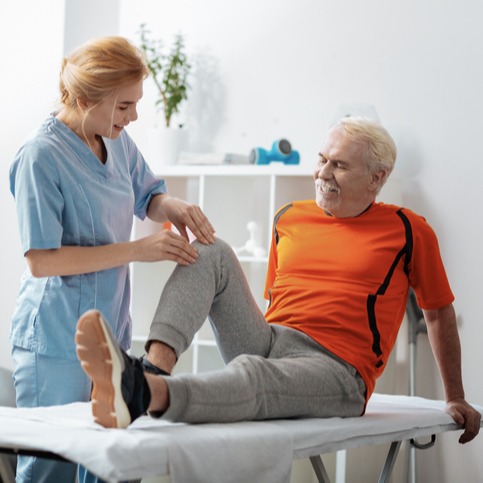
This May Benefit Your Neck Pain-diagnosed
Neck pain and neck problems, a common complaint many people grapple with, can significantly impede your daily activities and overall well-being. It can spring from many factors, such as poor posture, undue stress, or even an unexpected injury. Understanding and addressing this issue requires a comprehensive approach that blends self-care practices, lifestyle adjustments, and professional medical intervention when necessary.
Understanding Neck Pain
The complexities and causes of neck pain are vast, as it can emerge from various causes. The delicate structure of the neck, combined with its extensive range of movement, can lead to it becoming prone to injuries and conditions that trigger pain and limit motion. Common instigators of neck pain medication discomfort include poor posture, whiplash, and natural wear and tear associated with aging. Other factors, such as stress, carrying heavy items, or prolonged periods of sitting in front of a computer, can also contribute to neck pain.
Neck pain often improves over time with suitable self-care strategies. However, there are instances where medical attention is required. In cases where the pain is intense, persists for an extended period without improvement, radiates down the arms or legs, or is accompanied by symptoms such as headaches, numbness, weakness, or tingling, immediate medical consultation is advised.
Importance of Correct Posture
Posture plays a pivotal role in preventing and managing neck pain. Many of us adopt poor posture habits that harm our neck hurts spinal cord health without realizing it. Holding our bodies in unnatural positions consistently can strain the neck muscles, leading to discomfort and stiffness over time.
It's crucial to ensure your workstation or any environment where you spend significant time sitting is ergonomically designed. Your computer should be at eye level, your chair should provide solid neck and back support, and regular breaks to gently stretch out and move around should be taken. Even when standing or walking, practicing good posture by keeping your shoulders back and head level can be beneficial.
Heat and Cold Therapy
Heat and cold therapy are traditional, yet effective methods that have been used for centuries to help alleviate pain, including that of a stiff neck. The use of heat helps promote circulation, which in turn can aid in loosening up the muscles, providing a sense of relief. Heat also helps increase flexibility and reduce muscle spasms, offering a soothing effect on the neck muscles. Conversely, cold therapy can assist in reducing inflammation, a common cause of neck stiffness and pain. By numbing the painful area, cold therapy can provide immediate, albeit temporary, relief from discomfort.
Applying heat therapy can be as simple as a warm shower or heated towel. A hot water bottle or a heating pad can also be used if these are not viable options. This heat application helps increase blood flow to the stiff and painful area, expediting healing and reducing discomfort. For cold therapy, it's as easy as wrapping a bag of frozen peas or a cold pack in a cloth and applying it to the affected area. It's important to remember, however, to avoid applying ice directly to the skin, as it can cause frostbite or other skin damage. Always use a cloth or towel as a barrier to prevent such incidents.
Physical Exercise and Stretching
Engaging in regular physical activity and specific neck exercises can be significantly beneficial in managing neck pain. Physical activity helps strengthen the muscles, reducing the likelihood of muscle strain, and pain. Moreover, it aids in maintaining a healthy weight, preventing additional stress on the neck and spine. On the other hand, specific neck exercises can help improve mobility, stretch stiff muscles, and relieve neck pain.
Neck stretches and exercises designed to maintain and improve the range of motion of the neck supports the cervical spine can be incredibly beneficial. These exercises can help ease the tension in the neck muscles, enhance blood circulation, and improve overall neck flexibility and strength. However, it's critical to approach these exercises gently and avoid any movements that cause further pain. If you need help with how to perform these exercises, it's always advisable to consult with a healthcare professional or physiotherapist. They can guide safe and effective exercises tailored to your needs and conditions.
Massage Therapy
Massage therapy is another powerful tool in the arsenal against back and neck pain. It has several benefits, including increasing blood flow, reducing muscle tension, improving range of motion, and promoting the release of endorphins, the body's natural painkillers. A professional massage therapist can provide targeted treatment based on your specific problem areas. However, even simple self-massage techniques can offer immediate relief in many cases.
While massage therapy can provide substantial relief prevent neck pain, it's important to remember that it isn't a cure-all. It's most effective when used as part of a comprehensive approach to neck pain management. Additionally, certain conditions may not be suitable for massage therapy. Therefore, discussing this option with your healthcare provider is crucial to ensure it's a safe and effective choice for you.
Over-the-Counter Medications
Over-the-counter (OTC) medications can be integral to your strategy for managing neck pain. Non-prescription drugs such as ibuprofen, naproxen, or acetaminophen can help alleviate pain and reduce inflammation. These medications block the chemicals in your body that cause inflammation and pain, providing temporary relief.
While OTC medications can be effective to relieve pain, they must be used responsibly. Always follow the dosage instructions on the package and be mindful of potential side effects, such as stomach upset. Additionally, certain OTC medications may interact with other drugs, so it's crucial to consult with a healthcare professional if you're taking other medications or have underlying health conditions. It's also worth noting that these medications offer symptomatic relief and do not address the root cause of neck pain.
Rest and Relaxation Techniques
In managing and ultimately alleviating neck pain, never underestimate the power of adequate rest. Resting provides the body with an opportunity to heal naturally. It's a period where the body can repair itself, reducing inflammation and strain on the affected muscles. However, it's important to distinguish between beneficial rest and prolonged inactivity when we speak of rest. While rest is crucial, extended bed rest is often counterproductive as it can lead to more serious neck pain worse than muscle stiffness and weakness. It is essential to strike a balance, resuming normal activities as soon as it's comfortable, but avoiding activities that may worsen the pain.
Complementing rest with relaxation techniques can profoundly impact managing neck pain. Techniques such as deep breathing and meditation offer numerous benefits. These practices aid in reducing muscle tension, a common contributor to neck pain, and promote a sense of overall well-being. Deep breathing exercises, particularly, promote better oxygen supply to the muscles, aiding in healing and pain reduction. Moreover, these techniques help reduce stress, a known exacerbating factor for most neck pain often. By managing stress effectively, you can decrease the frequency and intensity of neck pain episodes.
Professional Medical Intervention
If your neck pain persists despite trying various self-care measures, consider professional medical intervention. This is particularly important if your pain is severe, lasts for several days without any sign of improvement, or persistent pain is accompanied by other symptoms such as numbness, tingling, weakness, or pain radiating to the arms or legs.
Healthcare professionals can provide a comprehensive evaluation and diagnosis, leading to an effective treatment plan tailored to your specific needs. Treatment for neck injury may involve prescription medications, physical therapy, or in some cases, surgery. Physical therapy can provide targeted exercises to strengthen the neck and improve flexibility, while prescription medications can help manage pain more effectively than OTC drugs. Surgery may be required in rare cases where neck pain is due to a serious underlying condition.
Dealing with neck pain requires a multifaceted approach. From maintaining good posture and engaging in regular exercise to seeking professional medical help when necessary, each step can bring you closer to relieving neck pain. Remember, everyone's experience with neck pain is unique, and what works for one person might not work for another. It's important to find the best strategies for you and align with your lifestyle, medical history and personal health needs.
How do you know if neck pain is serious?
If you are unsure about the severity or cause of your neck pain, it's best to consult a doctor to determine if it is serious. Neck pain can range from minor discomfort to a sign of a more serious underlying condition. Seeking medical attention is important because certain symptoms may indicate a more severe issue. These can include persistent and severe pain, pain that radiates down the arm or into the fingers, numbness or weakness in the arms or hands, difficulty swallowing or breathing, and loss of bladder or bowel control. A healthcare professional can assess your symptoms, perform necessary tests and imaging studies, and provide an accurate diagnosis. Remember, your health should be a priority, so don't hesitate to seek medical help if you have concerns about your neck pain.
How can I relieve my neck pain?
One way to relieve your neck pain is by applying heat or cold therapy. Heat therapy can help relax and loosen tight muscles, while cold therapy can reduce inflammation and swelling. You can use a heating pad, hot water bottle, or warm towel for heat therapy. You can apply an ice pack wrapped in a thin cloth or a bag of frozen vegetables for cold therapy. Remember always to protect your skin from direct contact with extreme temperatures. Additionally, practicing stress reduction techniques and maintaining proper posture can relieve your neck pain. If your symptoms persist or worsen, seeking medical attention for proper diagnosis and treatment is important.
What are the red flags for neck pain?
Seek immediate medical attention if you experience red flag symptoms along with your neck pain, such as severe stiffness, radiating pain down the arms or legs, numbness or weakness in the extremities, difficulty walking or maintaining balance, or loss of bladder or bowel control. These symptoms may indicate a more serious underlying condition that requires prompt evaluation and treatment. Remember to prioritize your health and well-being long term neck pain by seeking medical help when necessary. Your healthcare provider can assess your symptoms, perform diagnostic tests if needed, and provide appropriate management strategies for your neck pain. Don't hesitate to reach out for professional assistance to ensure proper diagnosis and appropriate care for your specific situation.
What does a pinched nerve in the neck feel like?
A pinched nerve in your neck can cause sharp or shooting pain, numbness or tingling, and muscle weakness. It may feel like a sudden jolt of electric-like pain radiating down your arm or into your fingers. The pain can be intense and make it difficult to move your head or perform daily tasks. You may also experience a loss of sensation in certain areas, such as your shoulder or hand, and notice a weakness in the affected muscles. This condition can greatly impact your ability to serve others, as it limits your range of motion and causes discomfort. It is important to seek medical attention if you suspect you have a pinched nerve in your neck so that proper diagnosis and treatment can be provided to alleviate your symptoms and improve your quality of life.
What are the most common causes of neck pain?
If you have neck pain, the most common causes are poor posture, muscle strain or tension, herniated discs, arthritis, and whiplash injury. It's important to understand these causes so that you can take appropriate steps to alleviate your pain. Poor posture, such as slouching or hunching over for extended periods of time, can put strain on the muscles and ligaments in your neck. Muscle strain or tension often occurs from repetitive movements or strenuous activities that overwork the neck muscles. Herniated discs happen when the soft tissues and cushions between your vertebrae rupture and press against nearby nerves. Arthritis can cause inflammation and stiffness in the joints of your neck. Lastly, whiplash injury results from a sudden jerking motion of the head forward or backward, commonly caused by car accidents. By identifying the cause of your neck pain, you can seek appropriate treatment and prevent further discomfort in serving others with care and attention.
What illnesses can cause neck pain?
If you're experiencing neck pain, it's important to consider that various illnesses can be the cause. Some common illnesses that can lead to neck pain include arthritis, herniated discs, and even meningitis. Arthritis causes inflammation in the joints of the neck, resulting in pain and stiffness. Herniated discs occur when the soft cushioning between the vertebrae slips out of place and presses on nerves, causing discomfort. Meningitis is a serious infection that can cause severe neck pain along with other symptoms like fever and headache. If you're in neck pain treated are unsure about the severity or cause of your neck pain, it's best to consult a doctor for proper evaluation and treatment. Remember, seeking medical help is crucial for an accurate diagnosis and appropriate management of your condition.
What does cervical pain feel like?
When you experience cervical pain, it can feel like a sharp or dull discomfort in your neck area. Poor posture, muscle strain, herniated discs, arthritis, or a whiplash injury may cause it. You may also experience stiffness in the neck, headaches, limited range of motion, and numbness or tingling in your arms or hands. To diagnose your neck pain, a doctor will perform a physical examination and may order imaging tests such as X-rays, MRI, or CT scan. Treatment options include pain medications, physical therapy, heat or cold therapy, neck exercises and stretches, and injections. To prevent and manage neck pain at home, maintain good posture, take regular breaks from repetitive activities, use ergonomic equipment when possible, practice stress management techniques such as deep breathing or meditation. If your symptoms persist for more than a week or are accompanied by other concerning symptoms like chest pain or difficulty moving your arms or legs properly seek medical attention immediately to get proper diagnosis and treatment.
What are red flags for cervical pain?
To ensure your safety and well-being, it's important to be aware of red flags for cervical pain that may indicate a more serious underlying condition. If you experience severe neck pain that radiates down your arm or leg, or if you have difficulty walking, weakness in your arms or legs, or loss of bladder or bowel control along with neck pain, it's crucial to seek medical attention immediately. These symptoms could be signs of a herniated disc pressing on nerves or spinal cord compression. Additionally, suppose you have a history of cancer and develop new onset neck pain. In that case, if the pain is accompanied by unexplained weight loss and night sweats, or if you experience fever, chills, neck stiffness, it's important to consult a healthcare professional promptly. Remember, early detection and treatment can significantly affect your recovery.
How do you fix cervical pain?
You can alleviate cervical pain by practicing proper posture, regularly engaging in neck exercises and stretches, and seeking appropriate medical treatment for underlying causes. Maintaining good posture is essential to prevent further strain on your neck muscles and spine. Be mindful of your body alignment and practice good posture while sitting, standing, and sleeping. Incorporating neck exercises and stretches into your daily routine can help strengthen the muscles and improve flexibility, reducing pain and discomfort. It's important to consult with a healthcare professional to determine the underlying cause of your cervical pain and receive appropriate medical treatment. They may recommend pain medications, physical therapy, or other interventions tailored to your specific needs. Remember that taking care of yourself is crucial in serving others effectively.
Is cervical neck pain serious injury?
If left untreated, cervical neck pain can potentially have serious consequences and impact your daily life. Ignoring the pain may lead to further complications and hinder your ability to carry out everyday activities. It is crucial to understand that cervical neck pain should not be taken lightly, especially if it persists or worsens over time. Seeking medical attention and proper treatment is essential for managing and alleviating your symptoms. Remember, serving others starts with taking care of yourself first. By addressing your cervical neck pain promptly, you can ensure that you are in optimal health to continue serving those around you. Do not hesitate to seek help from healthcare professionals who specialize in treating neck pain; they will guide you through the necessary steps for diagnosis, treatment, and prevention strategies tailored to your specific needs.
How do you fix chronic neck pain?
One effective way to alleviate chronic neck pain is through regular physical therapy sessions that focus on strengthening your muscles and improving flexibility in your neck. Physical therapy can help you reduce pain, increase range of motion, and improve your overall quality of life. During these sessions, a trained therapist will guide you through exercises and stretches specifically designed to target the muscles in your neck. They will also provide hands-on techniques such as manual therapy or massage to help relieve tension and promote healing. In addition to the in-office sessions, they may also provide you with at-home exercises and self-care techniques to continue your progress outside of therapy. By consistently attending physical therapy sessions and following their recommendations, you can take an active role in managing your chronic neck pain and experience long-term relief.
What causes persistent neck pain?
To understand the causes of your persistent neck pain, it's important to consider factors such as poor posture, muscle strain or tension, herniated discs, arthritis, and whiplash injuries. These factors can contribute to ongoing discomfort and limit your ability to serve others effectively. Poor posture puts excessive strain on the muscles and ligaments in your neck, leading to pain and stiffness. Muscle strain or tension from repetitive activities or stress can also contribute to persistent neck pain. Conditions like herniated discs and arthritis can cause inflammation and compression in the cervical spine, resulting in chronic discomfort. Additionally, whiplash injuries from accidents or falls can lead to long-lasting neck pain. By understanding these causes, you can take steps towards managing your condition and seeking appropriate treatment for relief.
Is it normal to have neck pain every day?
Having neck pain every day can be a sign of an underlying condition that a healthcare professional should evaluate. It's important to listen to your body and seek medical help if you experience persistent neck pain. Ignoring it or hoping it will go away alone may only worsen the situation and lead to further complications. Remember, taking care of yourself is essential in order to serve others effectively. Your well-being directly impacts your ability to provide assistance and support to those who rely on you. So, prioritize your health and seek proper diagnosis and treatment for your neck pain. This will alleviate your discomfort and ensure that you can continue serving others with strength and vitality.
How serious is chronic neck pain?
If you experience chronic neck pain, it is important to understand that its severity can vary and should not be ignored. Chronic neck pain refers to persistent or recurring pain in the neck region that lasts for more than three months. It can significantly impact your daily life and hinder your ability to perform simple tasks. While some cases of chronic neck pain may be mild and manageable, others can be severe and debilitating. Ignoring chronic neck muscle pain can lead to further complications and worsen your condition over time. It is crucial to seek medical attention if you are experiencing chronic neck pain, as a healthcare professional can provide a proper diagnosis and develop an effective treatment plan tailored to your needs. Remember, taking care of your health should always be a priority, especially when it comes to managing chronic conditions like neck pain.
Sources
1. https://www.healthline.com/health/how-to-get-rid-of-a-stiff-neck
2. https://www.webmd.com/a-to-z-guides/remedies-for-stiff-neck#:~:text=This%20can%20cause%20inflammation.,to%20rest%20stiff%20neck%20muscles
3. https://www.mayoclinic.org/diseases-conditions/neck-pain/symptoms-causes/syc-20375581
4. https://www.health.harvard.edu/pain/say-good-night-to-neck-pain






